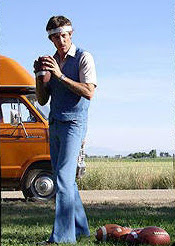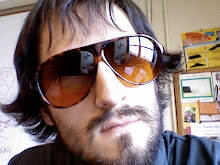9.26.2007
In recent insignificant news:
As of yesterday, my car radio cuts out when in reverse or park. I didn't think the radio had anything to do with the gears. I guess this is what distinguishes a teacher from an automotive engineer.
9.20.2007
Thoughts on "Why is everything [in 'Black Ice'] so race focused?"
Lorene Cary doesn't have a choice but to focus on race. She has to look through the lens of what it means to be black, because to be black is to be a member of a non-dominant group and as such, she is not granted the same power and privilege that is would otherwise be assumed as a member of the dominant group. Having been assigned a "position" by the dominant group, which is often reinforced by stereotypes, race is more apparent; Cary consciously sees, lives, and breathes it every day. It defines her, though again, she did not choose for this to be the case. Her daily experience constantly reinforces this point, as informed by the culture of power. She didn’t make the rules, but is forced to live by them.
People in dominant groups, on the other hand, don’t have to look through the lens of what it means to be dominant, to have power, to have privilege. All of this is assumed, implied, and especially so if they were born into this power and privilege. They know nothing else. They are less inclined to "see, live, and breathe” their position and the greater implications of it because it is constantly reinforced—whether consciously or not!—by those around them, most of whom are also members of the dominant group. They "made" the rules and have the choice to break them, ignore them, or as is too often the case, pretend they don't even exist.
I welcome your thoughts.
People in dominant groups, on the other hand, don’t have to look through the lens of what it means to be dominant, to have power, to have privilege. All of this is assumed, implied, and especially so if they were born into this power and privilege. They know nothing else. They are less inclined to "see, live, and breathe” their position and the greater implications of it because it is constantly reinforced—whether consciously or not!—by those around them, most of whom are also members of the dominant group. They "made" the rules and have the choice to break them, ignore them, or as is too often the case, pretend they don't even exist.
I welcome your thoughts.
9.17.2007
Challenge: Before Wednesday's class ...
1. What does W.A.S.P. mean? Find out. Post your response.
2. Scope out St. Paul's School and impress Wednesday's guest, Mr. Mahoney, with your ill knowledge of all things SPS.
2. Scope out St. Paul's School and impress Wednesday's guest, Mr. Mahoney, with your ill knowledge of all things SPS.
9.16.2007
Irony.
So, The Eighth Block is launched and the email to hype its debut is out. And as I admire the fruits of labor of nearly an entire weekend--although I admit I did take a few breaks: for my Lake of the Isles run, to check out Minneapolis' Dance Band (from which I took this week's quote) and of course, to watch the Packers bruise the Giants 35-13--I can't help but think where this thought was going before the insertion of a tangental sentence clause. Ah yes, as I admire the fruits of labor of nearly and entire weekend, I can't help but realize that this American Lit class blog is needing more, well ... American Lit. True, you can visit the Online Resources and download duplicate copies of all class handouts, but that will only get you so far. Look for more American Lit-related content soon: extended metaphors, stock characters, enjambments, heroic couplets, and the like. Look for subtext, too; it'll be there, just tougher to find.
9.15.2007
Borne ceaselessly into the past.
Ultimately, literature is a study of the past. Writers assemble (and sometimes disassemble) the images of their life in order to recreate themselves and the characters of their life in the present moment. But the present moment soon becomes the past, and the process repeats itself. Present. Past. Present. Past. Repeat. The present only exists but for a ... now ... and now. Now. And then it is gone. It is the past.
No matter how hard we try to project ourselves into the future, the past is always present, informing and affecting each thought, each action, each pen stroke. The future is unknownable, out of grasp. Our best effort to conceptualize it will always fall short. The future is merely a thrift store of antique memories for which we hope to get a good deal on and refurbish when we have the time. But then again, what is time but a measurement of the past?
prb.
No matter how hard we try to project ourselves into the future, the past is always present, informing and affecting each thought, each action, each pen stroke. The future is unknownable, out of grasp. Our best effort to conceptualize it will always fall short. The future is merely a thrift store of antique memories for which we hope to get a good deal on and refurbish when we have the time. But then again, what is time but a measurement of the past?
prb.
Subscribe to:
Comments (Atom)





